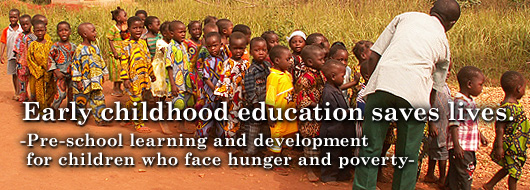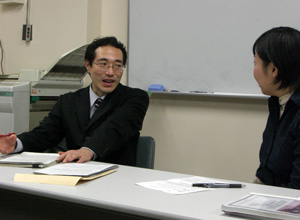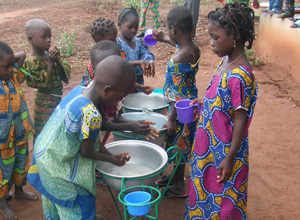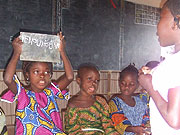No.24 1 Jun. 2009
Early childhood education saves lives.

INDEX
- P1Early Childhood Education Saves Lives.
- P2The potential of early childhood education in developing countries 1.
- P3The potential of early childhood education in developing countries 2.
The potential of early childhood education
in developing countries 1.

Interview between An expert and a HFW Programme Coordinator for Benin.
Associate professor Hamano Takashi from the Ochanomizu University
Tomita Toko, programme coordinator for Benin and Burkina Faso from the HFW development project division.
Hardly anything is known about the actual situation pertaining to early childhood education in developing countries. What is the current state of affairs and what kind of issues exist? Additionally, what is the role of early childhood education in such countries?
A staff member from Hunger Free World (HFW), which is operating kindergartens in a village in Benin, spoke with Mr. Hamano Takashi, an associate professor at the Ochanomizu University. The latter college is currently accepting kindergarten teachers from 5 Mid-West African nations and coordinating their training.
Tomita
HFW has been operating a kindergarten in Gbeto village in Southern Benin, West Africa since October, 2006. Although the impact of these initiatives is gradually becoming evident, at the time when we embarked on the project, we held doubts about what the outcomes would be and whether setting out to support early childhood education was really a high priority. Generally speaking, what role does early childhood education play in developing nations?
Hamano
First of all, early childhood education provides preliminary education for children before they begin their schooling. For example, in Benin and other West African nations, examinations for proceeding to higher grades are conducted even in elementary schools. In many cases, children who start elementary school without receiving any prior preparation do not perform well in their studies and repeat grades, and this ultimately results in such children leaving school before they have completed their studies.
Particularly in the case of children who live in rural areas, many of the parents never attended school, and, as a result, the children have almost no opportunity to come into contact with French, the official language, at home. These children must suddenly take classes conducted in French from the day when they enter primary school. As a result, the speed at which these children learn is slower if compared to that of children from urban areas who have had opportunities to come into contact with French. Nevertheless, these children must still take the same examinations for moving into higher grades in order to continue their studies.
Early childhood education should be able to fill such gaps; however, early childhood education facilities are concentrated in urban areas. Almost all kindergartens are private facilities, and, as there is no public funding, these facilities are concentrated in areas where parents are very aware of the benefits, would like to enable their children to receive early childhood education and are able to independently afford such facilities. In other words, parents who are capable of paying the fees.
If early childhood education becomes widely available in rural areas, it should be possible to fill the academic gaps that form before children start going to school.
Tomita
The children who graduate from kindergarten operated by HFW have been evaluated as responding very well to their teachers’ questions and also being very talkative, even at elementary school. This underlines the importance of the linguistic groundwork that children do while they are young.
Hamano
That’s right. Brain function develops extremely rapidly during the period when a child is an infant, and, in some cases, children are not able to make up that developmental gap even in 6 years of elementary school. The same might be said for their physical development. Most poor children who live in rural areas are malnourished, and, as they have also not learned proper hygiene habits, they are prone to falling ill. At kindergarten, it is possible to perform health care activiites that poor families are unable to do at home, such as providing the minimum level of nutrition that children need through the provision of school meals and conducting regular health examinations.
Tomita
At the kindergarten in Gbeto village, we are actively conducting education on health and hygiene, such as teaching children to wash their hands. Actually it is quite intriguing, because at home, before meals, the children start to ask their parents, “Have you washed your hands?” so this is even having an impact on the habits of family members. At the same time, I have even heard stories of some fathers, who are happy with the changes they have seen in their children and have begun to help with household chores such as getting the child ready for kindergarten.

Children washing their hands after going to the toilet

Hamano
As you just mentioned, we are also researching this significant effect of the children passing on education about hygiene and nutrition to their families. The change in the young children is really remarkable, and this also has a big impact on their families.
Something that we often see in rural parts of Asia is how when early childhood education becomes widespread, children who were unable to go to school because they were looking after young siblings become able to attend school. Apparently, this has been particularly effective in raising the school attendance rate of young girls. Mothers also have more free time, allowing them to increase the amount of time they can devote to work such as farming. Therefore, early childhood education has also been linked to increased household income. This is the same healthcare role that childcare centers played in Japan, isn’t it?
Early childhood education performs a variety of functions for the growth of children and their families. This is why it might be termed the very crossroads of education, health and welfare.
Tomita
I can see now that it is more than merely an opportunity for children to be educated. At some kindergartens in Benin, the teachers are so passionate about teaching French that if the students aren’t able to do something in class, they are smacked with a stick.
Hamano
In most developing countries, early childhood education is forever viewed as “an opportunity for study,” and positioned in the same way as post-elementary school education. For this reason, the educational guidelines for early childhood education are set out in detail by national regulations. Everything is determined, right down to what is taught on a certain day of a certain month. Under these circumstances, it is not possible to match what is taught with each child’s individual development. Early education provides an opportunity to encourage the development of children before they begin to acquire knowledge. Furthermore, the individual differences between young children are surprisingly large. Just imagine if you take two children in the same class, one who is three years and one month old and another who is three years and ten months old – they are completely different, aren’t they? In early childhood education, the perspective of responding to the each child is really important. For this reason, in the educational guidelines and childcare policies of Japan, there are no detailed conventions in relation to the curriculum. When we tell this to our African kindergarten teachers, they are very surprised.
Tomita
The teachers at our kindergarten in Gbeto were all originally teachers at local primary schools. They reported that the hardest thing about teaching at a kindergarten was to have to think about and prepare the daily lesson content in contrast to teaching at an elementary school where they were told that they should simply teach in accordance with the textbook. Nowadays, however, they are able to create new learning materials based on the children’s response.
Hamano
In Japan, it is increasingly becoming the norm for preschool teachers to create a journal to track the growth of each child and maintain close contact with that child’s parents. Initiatives that consider the educational content of classes based on each individual child in this way are called “Child-centered” approaches to learning. Of course, I do not think that simply imposing on developing countries the way in which early childhood education is conducted in Japan would work very well. On the other hand, in most developing countries, curriculums and teaching methods that are suited to the circumstances of the country and region have not been adequately developed.

Learning how to write our names while singing a song

Teaching materials that were developed in Benin reflecting the their culture

Tomita
I had never heard of such journals before, thank you for letting me know about it. At the kindergarten in Gbeto village also, there was no rural precedent and so we are learning by trial and error. We began by training the teachers about child psychology so as to enable them to observe the children’s development. We had considered registering the kindergarten with the government for the purpose of enabling them to be managed by government fund; if we did this, however, the kindergarten would have to follow a uniform kindergarten curriculum and so for the first few years, we intend to manage the kindergarten ourselves so that we can institute teaching models that are suited to the needs of children who live in rural areas.
NEXT The potential of early childhood education in developing countries 2.
